Pillar 2 Environmental and climate protection
For effective environmental and climate protection, we are committed to scientifically based climate targets and have confirmed this commitment by signing the Science Based Target Initiative (SBTi). We are lowering our energy consumption, investing in sustainable mobility and logistics solutions, and reducing our emissions and our water consumption. We collaborate with suppliers who are also committed to science-based climate targets. With our commitment to closed material cycles and innovative packaging solutions, we aspire to make efficient use of natural resources and protect the environment.
We reduce
our energy
consumption
our energy
consumption
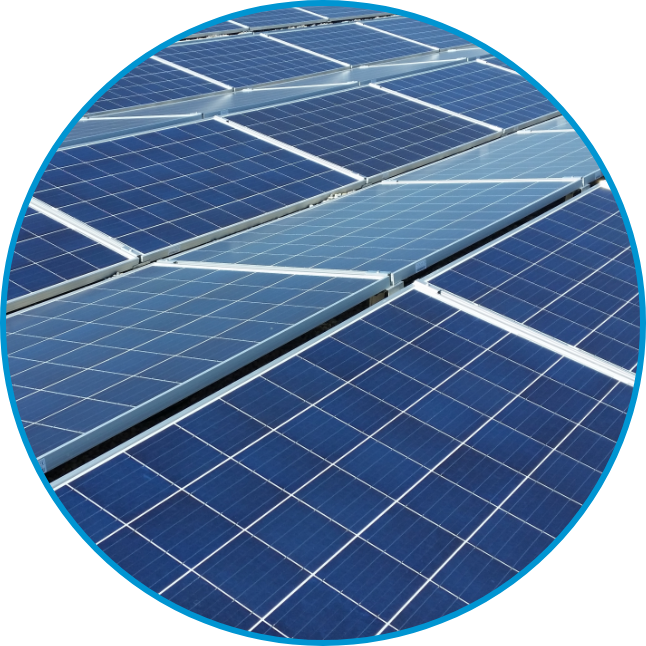
115 000
Photovoltaic units increased to 115 000 m2 of solar panels in Switzerland
REDUCING ENERGY CONSUMPTION
We need energy in all our business activities: at sales outlets, in logistics, at the manufacturing companies and in wholesale. We are continually cutting back on this energy consumption and use electricity from renewable energy sources, such as hydro, wind or solar power. We are rapidly increasing the number of photovoltaic units to generate solar energy on the roofs of our sales outlets, manufacturing companies and distribution centres. To further reduce our electricity consumption, we use energy efficiently with measures such as efficient lighting and electrical appliances. In new and renovated buildings, we use renewable energies for heating systems. In our distribution centres and production facilities we are continuing to switch to renewable heating, and we largely forgo fossil fuels in our rented properties. In addition to Scope 1 and 2, Categories 3.8 and 3.14 were also taken into account in the calculation.
115 000
Photovoltaic units increased to 115 000 m2 of solar panels in Switzerland
- Target 1
We are reducing absolute energy consumption by 8% compared to 2021.
Comments: We did not reach our target in 2022 and increased our energy consumption by 0.9% compared to 2021.
- Target 2
We are increasing the share of renewable energy sources to 90% (excluding transport).
Target attainment: in %, baseline value 2021
Comments: In 2022 we increased our share of renewable energy sources by 2.1%, bringing it to 82.2%. We narrowly missed our annual target of 82.4%.
Compared with 2021, which is the baseline year for data collection, our overall energy consumption in 2022 is 8 603 MWh higher. The reason for this is the electricity consumption and the energy consumption caused by transports. The increased energy consumption due to transports is mainly due to the growth of railCare. We set 2021 as the baseline year because we began our new strategy period in 2022, and are therefore tackling our climate strategy with science-based reduction schedules.
- Measures
- Newbuilds and renovations in warehouses, sales outlets and at head office planned and optimized according to environmental specifications and Minergie standard
- Use of 100% LED lighting in newbuild sales outlets and ongoing switch to LED in renovated stores
- Electricity from Switzerland, consistently from hydropower
- Low CO2 energy generation
- Construction of photovoltaic units on sales outlets and logistics centres and increase in rate of self-sufficiency for electricity
- Installation of closed refrigerating units and use of waste heat from cooling equipment
- Inner drive in 2022
- Newbuild: Photovoltaic unit on Fribourg Süd shopping centre in Villars-sur-Glâne
115 000
Photovoltaic units increased to 115 000 m2 of solar panels in Switzerland
- Target 1
We are reducing specific energy consumption per unit of goods sold by 5% compared to 2021.
Comments: We achieved our target in 2022 and reduced our energy consumption per product unit by 3% compared with 2021. This puts us on track.
- Target 2
We are increasing the share of renewable energy sources to 80%.
Target attainment: in %, baseline value 2021
Comments: With renewable energy making up 60.9% of our energy sources, we did not achieve our 64.8% target in 2022.
Compared with 2021, which is the baseline year for data collection, in 2022 we reduced our overall energy consumption by 9 993 MWh through savings on heating. We set 2021 as the baseline year because we began our new strategy period in 2022, and are therefore tackling our climate strategy with science-based reduction schedules.
- Measures
- Newbuilds and renovations in warehouses, production sites and at head office planned and optimized according to environmental specifications and Minergie standard
- Construction of photovoltaic units on manufacturing facilities and increase in rate of self-sufficiency for electricity
- Continued use of waste heat and cold occurring in production processes
- Use of renewable energies to generate heat (e.g. wood chippings or heat pumps)
- Low CO2 electricity generation and optimization of the electricity mix at production sites abroad
- Energy consumption analyses to identify scope for optimization in processing, and appropriate measures
115 000
Photovoltaic units increased to 115 000 m2 of solar panels in Switzerland
- Target
We are reducing specific energy consumption per m2 used by 10% compared to 2021.
- Comments
We achieved our target in 2022 and reduced our energy consumption per m2 of space used by 4.4% compared with 2021. This puts us on track.
Compared with 2021, which is the baseline year for data collection, in 2022 we reduced our overall energy consumption by 3 880 MWh through savings on heating. We set 2021 as the baseline year because we began our new strategy period in 2022 and are therefore tackling our climate strategy with science-based reduction schedules.
- Measures
- Newbuilds and renovation in warehouses, sales outlets and at head office planned and optimized according to environmental specifications and Minergie standard
- Low-CO2 energy generation
- Renewable energy sources to generate heat
SDGs
We reduce and
eliminate our
CO2e emissions
eliminate our
CO2e emissions

OPERATIONAL EMISSIONS
To minimize our impact on climate change, we want to reduce our direct CO2e emissions in Scope 1 and Scope 2. This encompasses emissions from directly controlled sources, such as trucks and heating, and emissions from the purchase of energy, such as electricity or heat. Therefore, in 2022 we ascertained the CO2e footprint of the whole Coop Group and, based on this, identified the measures necessary to further reduce our emissions. We offset emissions from business trips, coop.ch delivery trips, air freight and business vehicles through climate protection projects along our own supply chain. In order to reduce emissions in upstream processes along our value chain in the long term, we are working with strategically relevant suppliers who are committed to science-based climate targets. Along our supply chains we use projects to reduce CO2e emissions.
115 000
Photovoltaic units increased to 115 000 m2 of solar panels in Switzerland
- Target 1
As Coop Group, we are reducing the absolute CO2e emissions by 21% compared to 2021.
Comments: We reduced our CO2e emissions by 12.9% compared with 2021. We exceeded the target for 2024 in 2022 and are on track.
- Target 2
75% of our strategically important suppliers confirm the implementation of science-based climate targets.
Target attainment: in %, estimated baseline value
Note: By science-based climate targets, we mean emission reduction targets for Scope 1, Scope 2 and Scope 3 that contribute to limiting global warming to well below 2 °C by 2050. The data collected in relation to this target also include suppliers recognized as “committed” according to the criteria of the Science Based Targets initiative.
Comments: We exceeded the target for 2024 in 2022 and are on track. 46.6% of our strategically important suppliers pursue science-based climate targets. Strategically important suppliers are those that contribute to around 80% of turnover. Therefore, we can achieve the greatest possible impact with this target. The share is calculated on the basis of the results of the individual business units weighted according to 2021 turnover shares. Jumbo will report on this for the first time in 2023.
In 2022 our CO2e emissions from directly controlled sources owned by us (Scope 1) were 238 046 tonnes. When ascertaining this key figure, we took account of the following CO2e equivalents: CO2/CH4/N2O/HFCs/PFCs/SF6/NF3. The share of biogenic emissions was 21 156 tonnes of CO2e. We set 2021 as the baseline year for calculating these because we began our new strategy period in 2022 and are therefore tackling our climate strategy with science-based reduction schedules. In 2021, CO2e emissions in Scope 1 were 235 945 tonnes. We used the “operational control” approach as per the GHG Protocol to calculate CO2e emissions.
In 2022 our CO2e emissions from purchased energy (Scope 2) totalled 58 318 tonnes. When ascertaining this key figure, we took account of the following CO2 equivalents: CO2/CH4/N2O/HFCs/PFCs/SF6/NF3. We set 2021 as the baseline year for calculating these because we began our new strategy period in 2022 and are therefore tackling our climate strategy with science-based reduction schedules. In 2021, CO2e emissions in Scope 2 were 104 378 tonnes. We used the “operational control” approach as per the GHG Protocol to calculate CO2e emissions.
- Measures
- Commitment to Science Based Targets initiative (SBTi) and attendant reduction in emissions according to science-based reduction schedules
- We discussed our commitment to the SBTi beforehand with our partner the WWF, and it is explicitly welcomed and supported by the WWF. Accordingly, the targets set will be incorporated in the climate action section of the performance agreement with the WWF.
- Pioneer in hydrogen-fuelled mobility, as a founder of the H2 Mobility Association and with the construction of Switzerland’s first public hydrogen filling station
- Promotion of electromobility
- Use of carbon-neutral biodiesel from organic waste for our trucks (e.g. frying oil from our manufacturing companies and restaurants)
- Guideline on Sustainable Construction for Newbuilds and Renovations
- Founding member of WWF Climate Savers and now a Climate Partner of the WWF
- Avoidance of air freight or reducing it to an absolute minimum
- Conscious offsetting of emissions caused by air freight, coop.ch delivery trips and business tripsn
- Delivery of climate protection projects according to the Gold standard with the WWF
- Inner drive in 2022
- Fund project: continuation of climate protection project in Brazil with Fair Recycling
115 000
Photovoltaic units increased to 115 000 m2 of solar panels in Switzerland
- Target As Coop Group, we are reducing the absolute CO2e emissions by 21% compared to 2021
- Comments As regards our CO2e emissions, at the Coop Group we pursue an overarching target. Our progress towards that target can be seen in the “Retail” section.
- Measures
- Commitment to Science Based Targets initiative (SBTi) and attendant reduction in emissions according to science-based reduction schedules
- Use of carbon-neutral biodiesel from organic waste for our trucks (e.g. frying oil from our manufacturing companies and restaurants)
- Guideline on Sustainable Construction for Newbuilds and Renovation
115 000
Photovoltaic units increased to 115 000 m2 of solar panels in Switzerland
- Target 1
As Coop Group, we are reducing the absolute CO2e emissions by 21% compared to 2021.
Comments: As regards our CO2e emissions, at the Coop Group we pursue an overarching target. Our progress towards that target can be seen in the “Retail” section.
- Target 2
50% of our strategically important own-label brand suppliers confirm the implementation of science-based climate targets.
Target attainment: in %, estimated baseline value
Note: By science-based climate targets, we mean emission reduction targets for Scope 1, Scope 2 and Scope 3 that contribute to limiting global warming to well below 2 °C by 2050. The data collected in relation to this target also include own-label brand suppliers recognized as “committed” according to the criteria of the Science Based Targets initiative.
Comments: We exceeded the target for 2023 in 2022 and are on track. 22.3% of our strategically important own-label brand suppliers pursue science-based climate targets. Strategically important own-label brand suppliers are those that contribute to around 80% of turnover. Therefore, we can achieve the greatest possible impact with this target. The share is calculated on the basis of the results of the individual business units weighted according to 2021 turnover shares.
- Measures
- Commitment to Science Based Targets initiative (SBTi) and attendant reduction in emissions according to science-based reduction schedules
SDGs
With railCare,
we are systematically
switching our
goods transport
within Switzerland
from road to rail
we are systematically
switching our
goods transport
within Switzerland
from road to rail
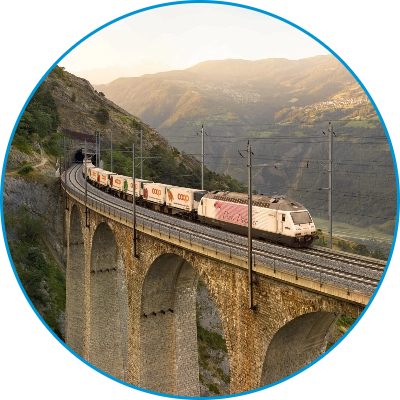
16 m
road kilometres saved by shifting to rail
Rail transport
Coop transports more goods by rail than any other Swiss retailer
ENVIRONMENTALLY FRIENDLY FREIGHT
By shifting our goods transportation in excess of 90 kilometres to rail, we are reducing the environmental impact in our logistics. As a result, we have already saved more than 16 million kilometres on the roads and, at almost 40%, are the retailer with the highest share of rail transport in Swiss delivery traffic. We use alternative fuels, such as biodiesel from waste or biogas, and are committed to innovative fuels such as hydrogen. We are reducing air freight to an absolute minimum. For unavoidable air freight as well as business trips and coop.ch delivery trips, we are taking responsibility by investing in climate protection projects with the WWF along our own supply chains. By basing our range around seasonal and regional products, we promote the purchase of products that have travelled shorter distances.
115 000
Photovoltaic units increased to 115 000 m2 of solar panels in Switzerland
- Target65% of our goods transportation is effected using low-emission means of transport (own means of transport).
Target attainment: in %, baseline value 2021
115 000
Photovoltaic units increased to 115 000 m2 of solar panels in Switzerland
- CommentsAt 24.2%, we did not achieve our target in 2022 for the share of goods transported using low-emission means of transport, and are continuing to work on this. Jumbo will report on this for the first time in 2023.
- Measures
- Consistently shifting our goods transportation from road to rail for distances in excess of 90 kilometres
- Cargo sous terrain (CST): switching goods transport underground – initiation and co-development of the project from the outset
- Use of hydrogen trucks
- Use of electric trucks
- Use of carbon-neutral biodiesel from organic waste for our trucks
- Analysis system for optimizing the driving behaviour of our diesel trucks
- Inner drive in 2022
- Fund project: further headway with the development of a nationwide hydrogen filling station network in Switzerland with the association H2 Mobility Switzerland
- Pilot project using e-transporters to deliver orders
115 000
Photovoltaic units increased to 115 000 m2 of solar panels in Switzerland
- Target We are planning specific measures and projects for this key issue over the next few years.
115 000
Photovoltaic units increased to 115 000 m2 of solar panels in Switzerland
- Target30% of our goods transportation is carried out using low-emission means of transport (our own means of transport).
Target attainment: in %, baseline value 2021
115 000
Photovoltaic units increased to 115 000 m2 of solar panels in Switzerland
- CommentsIn 2022 we used low-emission means of transport for 4.5% of our freight. This means we did not achieve our target of 7.9% in 2022. Transgourmet Poland and Romania are excluded from this target.
- Measures
- Greater efficiency in logistics, switching goods transport
- Promotion of innovative transport systems based on renewable energies
- Development and trialling of future-proof mobility systems
- The truck fleets of all national subsidiaries are being steadily switched to renewable fuels
SDGs
We consistently close, slow down and reduce our material cycles
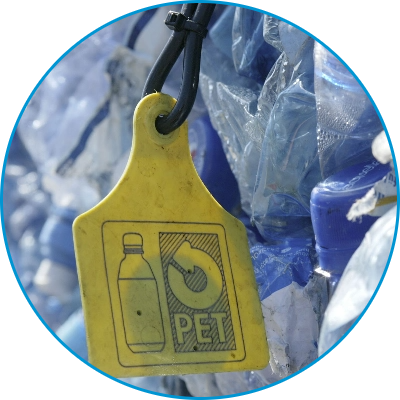
20 m
plates of food donations to “Tischlein deck dich” and “Schweizer Tafel” food banks
CLOSING MATERIAL CYCLES
We aim to reduce our consumption of resources and use materials as efficiently and for as long as possible in closed cycles. Therefore, we are implementing innovative projects for the use of by-products of food production and closing packaging cycles in logistics with reusable packaging. We are a member of the “Circular Economy Switzerland” network and have reinforced our commitment to promoting the circular economy by signing the Circular Economy Switzerland Charter. We rigorously separate the company’s unavoidable own waste so that we can recycle these reusable materials. We are cutting food waste to an absolute minimum with flexible ordering systems. Goods that we do not sell but that are still in perfect condition are donated to social institutions. Products no longer fit for consumption are used as animal fodder or recycled at biogas plants.
115 000
Photovoltaic units increased to 115 000 m2 of solar panels in Switzerland
- Target 1 We maintain a waste recycling rate of at least 84%.
Target attainment: in %, baseline value 2020
Comments: With a waste recycling quota of 79.3%, we fell just short of our 80.6% target in 2022 and are continuing to work on this. We generated 141 391 tonnes of waste in 2022, of which we recycled 112 052 tonnes. 29 339 tonnes were disposed of as general waste.
More information: Policy Paper on the Circular Economy
- Target 2
We avoid food waste and ensure that 99.5% of food from our food sales outlets is for human consumption. Our aim is to double the volume of food we donate.
Target attainment: in %, estimated baseline value
Comments: In 2022, 96.6% of food was consumed by humans, so we did not quite achieve the target of 97.3% set for 2022. However, we did donate food that was still fit for consumption, providing enough for a total of 20.18 million full plates. We are therefore on track with our target of doubling the amount we donate.
- Measures
- Each point of sale has a disposal concept specific to it and the specialist format involved
- Monthly recording of materials separately collected and recycled at sales outlets
- Sparing use of resources, promotion of their reuse through targeted waste management and the circular economy: reduction in volume of household waste, optimization of materials (taking due account of longevity, repairability, modularity) and increase in recycling rate
- Commitment to Swiss Recycling’s “circular economy platform” and to the “Allianz Design for Recycling Plastics”
- Organic waste is transformed into animal feed, biogas, biodiesel for our trucks, and the digestate into compost and liquid fertilizer for agriculture
- Guideline on secondary packaging
- Inner drive in 2022
- Fund project: partnership with “Schweizer Tafel” and “Tischlein Deck’ Dich” food banks to prevent food wast
- Action 404: closing cycles in logistics with reusable packaging
- Circular sales outlet: store design with materials that can be reused in shop fitting after dismantling
- Pilot project with Too Good To Go: available in 150 Coop supermarket sales outlets
- Pilot project on food donations of frozen fresh meat towards the long-term goal of “Zero Waste in Meat”
115 000
Photovoltaic units increased to 115 000 m2 of solar panels in Switzerland
- Target 1 We maintain a waste recycling rate of at least 86%.
Target attainment: in %, baseline value 2020
Comments: With a waste recycling quota of 84.6%, we fell just short of our 85.8% target in 2022 and are continuing to work on this. We generated 209 359 tonnes of waste, of which we recycled 177 195 tonnes. 32 164 tonnes were disposed of as general waste.
More information: Policy Paper on the Circular Economy
- Target 2
We avoid food waste and ensure that 99% of food produced reaches the sales channels.
Target attainment: in %, estimated baseline value
Comments: In 2022, 99.1% of food was consumed by humans, so we narrowly missed the target of 99.3% set for 2022.
- Measures
- Organic waste is transformed into animal feed, biogas, biodiesel for our trucks, and the digestate into compost and liquid fertilizer for agriculture
- Closure of product cycles
- Analysis of industrial sidestreams at all manufacturing companies
- Monthly recording of reusable materials separately collected and recycled
- Sparing use of resources, promotion of their reuse through targeted waste management and the circular economy
- Inner drive in 2022
- SWISSMILL – Fund project extended: Zoí pilot project to recycle milling by-products
- HILCONA: Development of a plant-based egg alternative from chickpea water, a by-product of hummus production
115 000
Photovoltaic units increased to 115 000 m2 of solar panels in Switzerland
- Target 1 We maintain a waste recycling rate of at least 70%.
Target attainment: in %, baseline value 2021
Comments: A great success: We achieved our target in 2022, with a recycling quota of 78.7%. We have therefore exceeded the target for 2026. We generated 48 236 tonnes of waste, of which we recycled 37 950 tonnes. 10 286 tonnes were disposed of as general waste.
More information: Policy Paper on the Circular Economy
- Target 2
We avoid food waste and ensure that 99.5% of food from our food sales outlets is for human consumption.
Target attainment: in %, estimated baseline value
Comments: In 2022, 99.2% of food was consumed by humans, so we achieved our target for 2022.
- Measures
- Recording of reusable materials separately collected and recycled
- Ongoing reduction in residual waste volume
- Sparing use of resources
- Promotion of recycling with targeted waste management
- Inner drive in 2022
- Projects at all national subsidiaries involving food donations to people in poverty
SDGs
We reduce our
use of plastics
and rely on
sustainable
packaging
use of plastics
and rely on
sustainable
packaging
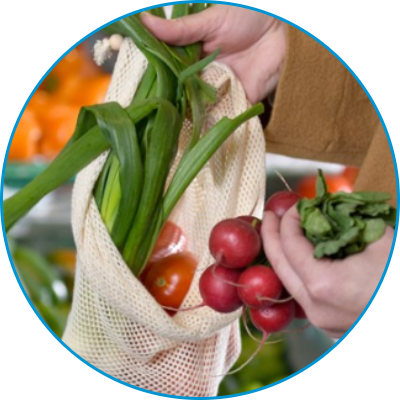
Innovation
innovative packaging, flower-wrapping paper made from plant waste, can be recycled and is compostable
OPTIMIZING PACKAGING, REDUCING PLASTIC
To save resources and avoid waste, we are continually reducing and optimizing our packaging material according to the 3R principle (Reduce, Reuse, Recycle) and switching to sustainable alternatives. In so doing, we consider the environmental footprint not just from a materials perspective: we take a holistic view of packaging with regard to its function and its influence on shelf life and on contamination of or damage to the product, in order to reduce potential food or product waste to an absolute minimum. Reducing and continually optimizing our packaging material enables us not only to save resources, but also save a lot of energy in manufacturing, transport and disposal.
115 000
Photovoltaic units increased to 115 000 m2 of solar panels in Switzerland
- Target 1 100% of our own-label products are ecologically packaged according to our packaging guidelines.
Target attainment: in %, estimated baseline value
Note: The data available for the 2022 financial year exclude Jumbo. The key figures are being obtained and will be disclosed from the 2023 reporting year onwards.
Comments: In 2022, 39.2% of our own-label brand products were already ecologically packaged. We therefore exceeded our target for 2022 by 19.2% and are on track.
More information: Policy Paper on Packaging and Plastic
- Target 2
We are reducing plastic consumption in our own-label brand packaging and disposable ranges by 20% compared to 2021.
Note: The data available for the 2022 financial year exclude Jumbo. The key figures are being obtained and will be disclosed from the 2023 reporting year onwards.
Comments: In 2022, with a 3% reduction in plastic used in our packaging and single-use ranges, we fell just short of our -4% target.
- Measures
- Steadily switching packaging to reduce plastic
- Expansion of range of unpackaged and reusable solutions in stores and in restaurants
- Packaging guideline: guideline with principles to promote sustainable packaging binding on 100% of our own-label brand suppliers
- Inner drive in 2022
- Fund project: raising awareness of littering through the Coop “Wanderpreis” challenge trophy on IGSU Clean Up Day
- Reducing plastic for carrots: with the new packaging made from FSC certified paper and cellulose film for all carrots in 1-kilogram packs we are saving around 60 tonnes of plastic per year. The packaging can be recycled with waste paper.
- Pilot project: organic milk in reusable glass bottles at over 100 supermarkets in the Nordwestschweiz-Zentralschweiz-Zürich region
115 000
Photovoltaic units increased to 115 000 m2 of solar panels in Switzerland
- Target
We are reducing plastic consumption per tonne of goods sold by 15% compared to 2021.
- Comments
We exceeded the target for 2024 in 2022 and reduced our plastic consumption per tonne of product by 9.9%.
More information: Policy Paper on Packaging and Plastic
- Measures
- Packaging guideline: guideline with principles to promote sustainable packaging binding on 100% of our own-label brand suppliers
- Use of reusable containers in production
115 000
Photovoltaic units increased to 115 000 m2 of solar panels in Switzerland
- Target
We are reducing the amount of plastic used per tonne of product in own-label brand packaging by 10% compared with 2021.
- Comments
In 2022 the amount of plastic used per tonne of product increased by 6% compared to the previous year. We did not achieve our 2022 target of reducing plastic by 2%. We are continuing to work on this reduction target.
More information: Policy Paper on Packaging and Plastic
- Inner drive in 2022
- Fund project – TG GERMANY: comprehensive plastic and packaging strategy developed
SDGs
We reduce and
optimize our own
water consumption
optimize our own
water consumption
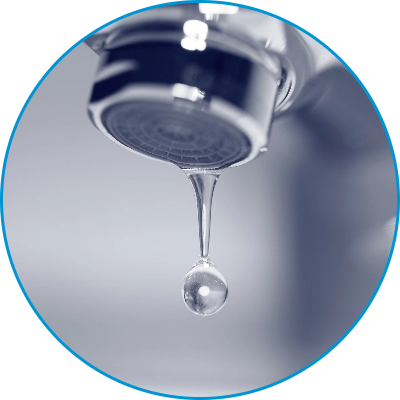
REDUCING WATER CONSUMPTION
As an international company, we bear responsibility for protecting natural resources. This includes not just our commitment to the sustainable use of fresh-water resources in our products’ supply chains, but also reducing and optimizing our own water consumption. Therefore, we record the water footprint of our operations on an annual basis and identify the measures necessary to further reduce our water consumption.
115 000
Photovoltaic units increased to 115 000 m2 of solar panels in Switzerland
- Target
We are planning specific measures and projects for this key issue over the next few years.
- Comments Our water consumption was 1 039 186 litres in 2022. The Coop Group’s total water consumption was calculated at 8 070 350 litres.
- Measures
- Adoption of process targets with the WWF in the area of water
115 000
Photovoltaic units increased to 115 000 m2 of solar panels in Switzerland
- TargetWe are planning specific measures and projects for this key issue over the next few years.
- Comments Our water consumption was 6 185 826 litres in 2022. The Coop Group’s total water consumption was calculated at 8 070 350 litres.
115 000
Photovoltaic units increased to 115 000 m2 of solar panels in Switzerland
- Target
We are planning specific measures and projects for this key issue over the next few years.
- Comments Our water consumption was 845 338 litres in 2022. The Coop Group’s total water consumption was calculated at 8 070 350 litres.
SDGs
